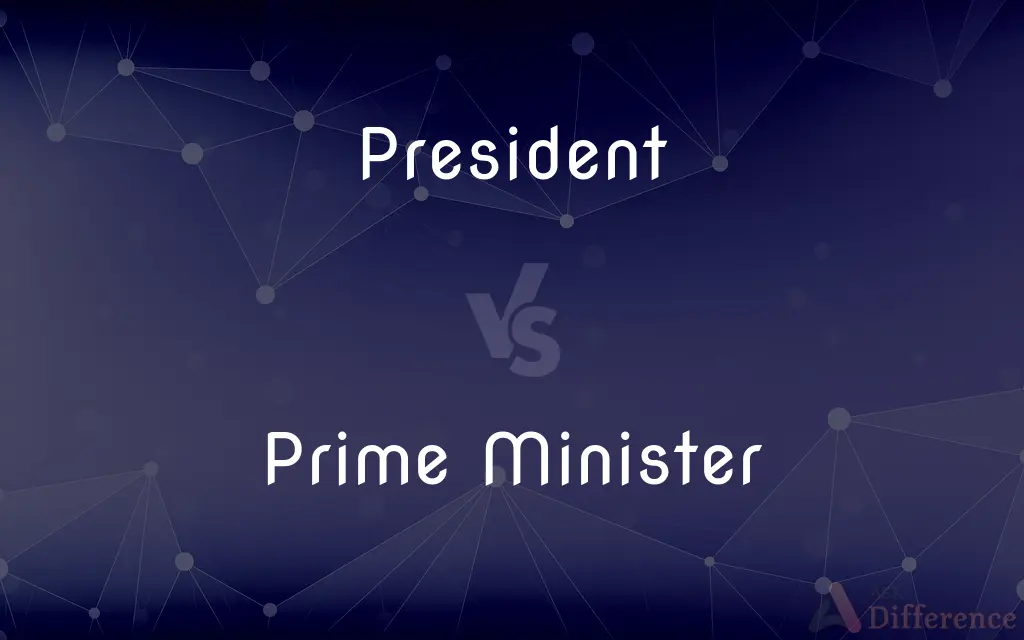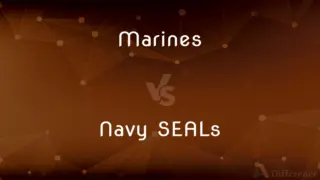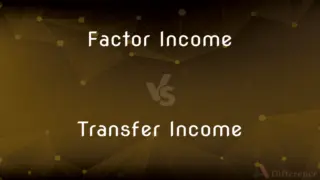President vs. Prime Minister — What's the Difference?
By Tayyaba Rehman — Published on October 28, 2023
A President is often a head of state and possibly government, elected either popularly or through an electoral body, while a Prime Minister, usually the head of government, is often chosen from the legislative body's majority party or coalition.

Difference Between President and Prime Minister
Table of Contents
ADVERTISEMENT
Key Differences
A President typically plays a significant role as a figurehead and leader of a country, embodying national unity and often having a role in governance and policy. Meanwhile, a Prime Minister tends to have a central role in government administration, directing cabinet and often influencing domestic policy and governance actively.
Presidents can have varied roles depending on a nation’s particular constitution: in some nations, the president wields significant power (e.g., the USA), while in others, they may primarily serve ceremonial duties (e.g., India). In contrast, Prime Ministers, as heads of government, typically manage the everyday operations of government, from policy implementation to administrative oversight, and may have less ceremonial prominence.
In the context of global diplomacy and foreign relations, Presidents often serve as the primary representative of their nation, engaging in discussions, treaties, and international relations. Conversely, Prime Ministers may also engage in diplomatic activities but might focus more on legislative management, policy creation, and maintaining the stability of their government through parliamentary means.
Considering power dynamics and authority, Presidents often hold veto power over legislative decisions and may have a defining voice in certain policies, especially in presidential systems. Alternatively, Prime Ministers, particularly in parliamentary systems, may need to maintain confidence and support within the parliament to ensure the stability and continuity of their leadership and policies.
Presidents might be directly elected by the populace or through an electoral mechanism and may not be directly accountable to the legislative body. Prime Ministers often emerge from the legislative body itself, usually being a leader of the majority party or coalition, and remain particularly accountable to this entity, with their tenure often being contingent on maintaining legislative support.
ADVERTISEMENT
Comparison Chart
Typical Role
Head of State (and possibly Government)
Head of Government
Election
Often Directly Elected
Usually Selected from Legislative Body
Foreign Representation
Primarily Represents Nation Abroad
Engages but May Focus on Domestic Policy
Power Base
May Have Independent Authority
Often Relies on Legislative Support
Accountability
May or May Not Be to Legislative Body
Typically to the Legislative Body
Compare with Definitions
President
The elected head of a republican state.
The President issued a new policy directive to address economic disparities.
Prime Minister
A principal public official appointed to oversee government policy and administration.
The Prime Minister’s policy reforms have impacted the education sector.
President
A leader presiding over a certain group or organization.
The President of the club welcomed the new members warmly.
Prime Minister
A political leader selected to head the government within a parliamentary framework.
The Prime Minister answered questions during the parliamentary session.
President
A person (in certain organizations) appointed to oversee and guide.
The board selected a new President to lead the upcoming initiatives.
Prime Minister
The majority party’s leader, responsible for shaping and implementing policy in government.
The Prime Minister met with community leaders to discuss urban development.
President
An individual who holds the highest office within a particular system.
The President’s speech at the assembly was motivational.
Prime Minister
The head of an elected government; the principal minister of a sovereign or state.
The Prime Minister will visit three countries to discuss trade partnerships.
President
The primary figurehead and often leader of a country.
The President addressed the nation during the crisis.
Prime Minister
The leader of the cabinet and often the chief officer of the government in parliamentary systems.
The Prime Minister proposed new legislation aimed at healthcare reform.
President
One appointed or elected to preside over an organized body of people, such as an assembly or meeting.
President
The chief executive of a republic.
President
The chief executive officer of the United States, with powers as determined by the US Constitution.
President
The chief officer of a branch of government, corporation, board of trustees, university, or similar body.
President
The head of state of a republic.
The vast majority of presidents have been male.
President
In presidential republics, the head of government and head of state.
President
Primary leader of a corporation. Not to be confused with CEO, which is a related but separate position that is sometimes held by a different person.
President
A person presiding over a meeting; a chair, presiding officer, presider.
President
Obsolete form of precedent
President
(archaic) Occupying the first rank or chief place; having the highest authority; presiding.
President
To act as president; to do presidential duties.
President
Precedent.
President
One who is elected or appointed to preside; a presiding officer, as of a legislative body.
President
A protector; a guardian; a presiding genius.
Just Apollo, president of verse.
President
Occupying the first rank or chief place; having the highest authority; presiding.
His angels presidentIn every province.
President
An executive officer of a firm or corporation
President
The person who holds the office of head of state of the United States government;
The President likes to jog every morning
President
The chief executive of a republic
President
The officer who presides at the meetings of an organization;
Address your remarks to the chairperson
President
The head administrative officer of a college or university
President
The office of the United States head of state;
A President is elected every four years
Common Curiosities
How is a Prime Minister typically chosen?
A Prime Minister is usually selected from the majority party or coalition within the legislative body.
Can a President be removed from office?
Yes, processes like impeachment (in some countries) allow for the removal of a President under specific circumstances.
Is the Prime Minister always a member of the legislature?
Typically, yes. Prime Ministers are often members of, and chosen from, the legislative body.
How does a Prime Minister impact domestic policy?
Prime Ministers often play a crucial role in shaping and implementing domestic policy through the government.
How does a Prime Minister maintain their position?
A Prime Minister typically must maintain the confidence of the majority in the legislative body to retain their position.
What is the role of a President in a parliamentary system?
In a parliamentary system, Presidents often have a more ceremonial and representational role, with less direct involvement in day-to-day governance.
How significant is a Prime Minister’s role in shaping foreign policy?
Prime Ministers can be pivotal in foreign policy, especially in parliamentary systems, where they may drive international relations and strategies.
What powers does a President have in foreign policy?
This can vary, but Presidents often have significant roles in determining and representing foreign policy.
Can a President also be a member of the legislative body?
This largely depends on a country's constitution, but generally, Presidents are not simultaneous members of the legislature.
What is the primary role of a President?
A President often serves as the head of state and possibly government, representing the nation, and may have various governing powers depending on the system.
Is a Prime Minister’s role influenced by the President in a semi-presidential system?
Yes, in semi-presidential systems, the powers are often shared between the President and the Prime Minister, influencing each other’s roles.
Can a President enact laws?
This depends on the specific governance system, but Presidents often have the power to propose, approve, or veto laws.
How does a Prime Minister interact with the head of state in a parliamentary system?
In parliamentary systems where the head of state (possibly a President or monarch) is separate from the head of government (Prime Minister), the Prime Minister typically manages government operations while coordinating with the head of state on certain matters, often adhering to formal and ceremonial protocols.
What is the usual term length for a President?
Presidential term lengths vary but are often four to six years, with possibilities of re-election depending on the country.
Share Your Discovery

Previous Comparison
Marines vs. Navy SEALs
Next Comparison
Factor Income vs. Transfer IncomeAuthor Spotlight
Written by
Tayyaba RehmanTayyaba Rehman is a distinguished writer, currently serving as a primary contributor to askdifference.com. As a researcher in semantics and etymology, Tayyaba's passion for the complexity of languages and their distinctions has found a perfect home on the platform. Tayyaba delves into the intricacies of language, distinguishing between commonly confused words and phrases, thereby providing clarity for readers worldwide.
















































